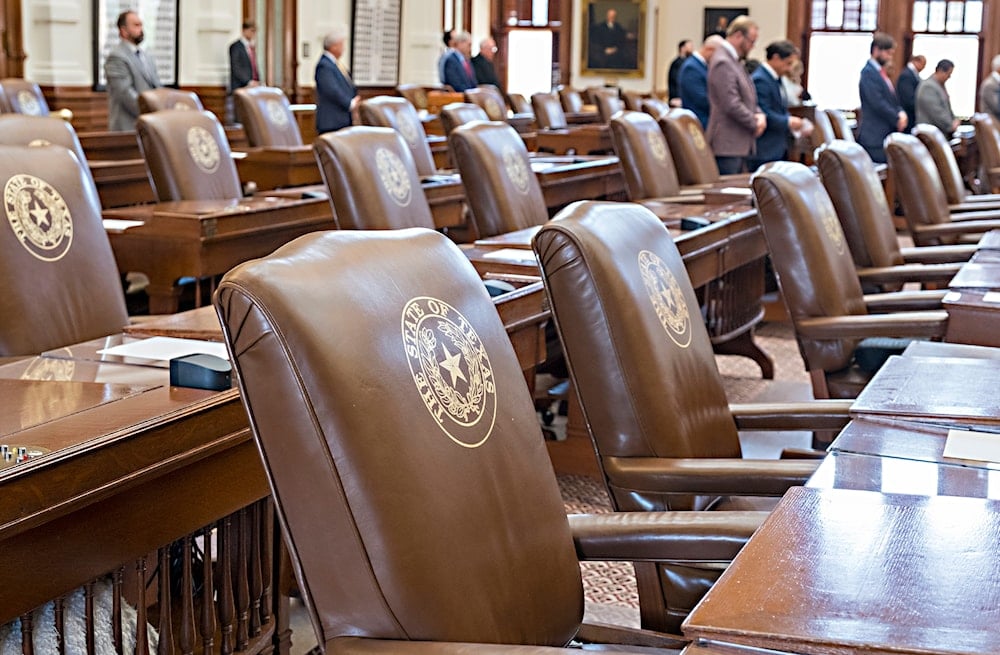Democrats court conservatives as party rethinks strategy: WashPo
Figures like Gavin Newsom, Josh Shapiro, and Rahm Emanuel are engaging with right-leaning platforms to test messages ahead of the 2028 presidential race.
-

Empty chairs belonging to House Democrats remain empty during session convocation in protest to a redistricting map in the State Capitol, Aug. 5, 2025, in Austin, Texas. (AP)
Naftali Bendavid of The Wall Street Journal writes that as several prominent Democrats explore potential 2028 presidential bids, they are increasingly stepping away from elements of liberal orthodoxy and taking their message to platforms that appeal to independents and even pro-Trump audiences.
California Governor Gavin Newsom recently appeared on a Tennessee podcast hosted by conservative former Navy SEAL Shawn Ryan, accepting a Sig Sauer pistol from his host and calling it “too cool.”
Soon after, Pennsylvania Governor Josh Shapiro joined a show hosted by pro-Trump activist and musician Ted Nugent, voicing support for Sunday hunting in his state as a matter of “freedom.”
Former Chicago Mayor Rahm Emanuel, meanwhile, told The Megyn Kelly Show that “a man cannot become a woman,” joking that such comments might land him in “witness protection” with his Democratic colleagues.
Centrists urge a shift after 2024 election loss
These appearances align with calls from within the Democratic Party, particularly among centrists, to learn from their 2024 defeat to President Donald Trump. They argue Democrats must distance themselves from left-wing positions that opponents can easily weaponize, while engaging more openly with conservative-leaning media.
“There is no question the party is starting to get the message. I’m delighted to see other members of the party speaking out,” said Representative Seth Moulton (D-Massachusetts), who faced criticism from fellow Democrats for addressing issues like trans athletes. “There are a number of issues where we have lost the trust of American voters because we are not listening to the concerns of the majority of Americans.”
Some believe Vice President Kamala Harris, the party’s 2024 presidential nominee, should have more forcefully repudiated progressive stances on immigration and COVID-era school closures, issues Republicans used to paint her as an out-of-touch liberal. Harris rarely addressed these topics directly, neither emphasizing nor explicitly rejecting them.
Polling shows deeper problems beyond messaging
A late July Wall Street Journal poll found the Democratic Party’s favorability at its lowest point in more than 30 years, with 63% of respondents viewing Democrats unfavorably and believing Republicans handle key issues better.
The party continues to debate how to reverse this trend, weighing which policies and messages will resonate most. Several potential 2028 contenders are already signaling an emphasis on independence, mindful of Trump’s success in portraying Democrats as beholden to “radical left lunatics.”
In January, Senator Ruben Gallego (D-Arizona) co-sponsored the Laken Riley Act, criticized by liberals for mandating federal detention of migrants charged with minor crimes. Maryland Governor Wes Moore vetoed a bill to study slavery reparations, drawing sharp criticism from civil rights groups.
Former Transportation Secretary Pete Buttigieg told NPR that while Trump’s efforts to dismantle federal agencies were “unconscionable,” those agencies had “serious problems” and Democrats were too quick to defend the status quo.
These moves have alarmed liberal activists who warned such positions risk legitimizing objectionable views and undermining the party’s values.
“It is never a winning strategy to sacrifice vulnerable communities,” said Brandon Wolf, national press secretary for the Human Rights Campaign. “When we enter those [conservative] spaces, we must remain rooted in rock-solid values and refuse to concede the right-wing frame.”
Risks of inauthenticity
Candidates risk appearing inauthentic if their outreach is purely performative. Historical examples include John Kerry’s awkward NASCAR outreach or Mitt Romney’s ill-fated “small varmints” hunting comment.
Shapiro, for example, was candid on Nugent’s podcast about not being a hunter, saying he respected Pennsylvania’s hunters and supported the change on principle. Nugent praised him as “my blood brother,” despite their political differences.
The appearance nonetheless drew attention, as Nugent has a history of inflammatory remarks.
Many Democrats see parallels to Bill Clinton’s 1992 “Sister Souljah moment,” when he publicly rebuked controversial remarks seen as racially inflammatory. Rahm Emanuel, who worked on Clinton’s campaign, said today’s party still hungers for candidates willing to confront its own extremes, though many now do so primarily on conservative platforms.
In his interview with Megyn Kelly, Emanuel positioned himself as a centrist, opposing men in women’s prisons or sports teams, saying, “That’s just biology.”
Republican strategist John Brabender said Democrats are recalibrating after their loss, aiming to reclaim centrist voters, even some who backed Trump. But he warned of the difficulty in appealing to the center without alienating the progressive base.
Some Democrats also believe Harris and other figures avoided conservative or widely watched neutral platforms, such as The Joe Rogan Experience, for fear of upsetting the left. Emanuel argued this was a mistake, “You can’t say you want to represent all of America and not talk to one part of America.”
Newsom’s outreach to conservatives
On July 14, Newsom appeared on The Shawn Ryan Show, where he accepted a pistol gift and said, “I’m not anti-gun at all. I’m just for common sense.” Newsom has also hosted his own podcast featuring right-wing guests like Charlie Kirk, with whom he discussed trans athletes in women’s sports.
While some praised the respectful tone, others criticized him for engaging with figures accused of racism and Islamophobia.
Some liberals question why Democrats feel pressure to reject progressive policies when Republicans face little pushback for courting their own extremes. Moulton welcomed the new outreach but warned the party must act faster, saying, “When you lose an election because of lost trust, you have to work hard to regain that trust.”
Read next: Democrats' slow shift on Gaza; symbolic or a step forward?: NYT

 6 Min Read
6 Min Read










